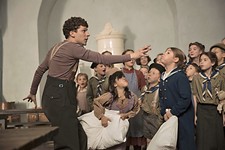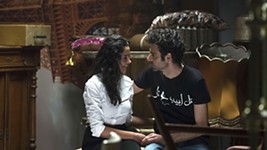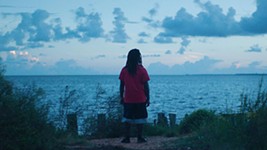Reexamining History at AJFF
Austin Jewish Film Festival wrap
By Anne S. Lewis, 9:15AM, Sun. Apr. 6, 2014
The 12th annual Austin Jewish Film Festival offered up yet another nicely curated slate of movies-with-a-Jewish-nexus for a broad range of ages and cinematic tastes, from serious docs like the eyebrow-raising Imaginary Witness: Hollywood and the Holocaust (2004) to more haimish fare like Hava Nagila: The Movie (2012) and The Sturgeon Queens (2013).

Many of the films were foreign-made – and not only from Israel – something that always adds a healthy remove and perspective to the American Jewish experience. One of this year's foreign film highlights was a Polish drama, Aftermath (2013), written and directed by Wladyslaw Pasikowski, set in present-day Poland but inspired by a 1941 wartime pogrom that took place in Jedwabne, Poland.
Until the publication in 2000 of Polish-born Princeton historian Jan T. Gross' book, Neighbors: The Destruction of the Jewish Community in Jedwabne, Poland, the official party line written by Poland's post-war Communist regime was that the Nazis were the perpetrators of the unspeakably savage massacre of 1,600 Jewish men, women and children who'd lived peaceably for generations alongside their Polish neighbors in Jedwabne and other nearby villages. Neighbors revealed that, in fact, it was not the SS but the Poles who'd turned on their own Jewish neighbors, torturing and humiliating them, raping and beheading women and trampling babies to death before herding the rest into a barn, drenching them in kerosene and torching the barn. Loud music was played to drown out the victims' screams while crowds looked on, laughing as their neighbors were incinerated. Gross' book sparked outrage and accusations of slander from Poland's right-wing, ultra-Catholic nationalists: Poland, or so the revisionist narrative went, lost 20% of its population during the war, it was clearly a Nazi victim and not a perpetrator of the extermination of the three million of its Jewish citizens included in that total. Fortunately, Neighbors also sparked a re-examination of the country's relationship to its Jewish population and the effects on it of the country's entrenched anti-Semitism. Pasikowski's film is an example of just that.
Aftermath tells the fictional story of two Polish brothers from the same impoverished region as Jedwabne, one of whom has been targeted by his Klan-like neighbors for reclaiming headstones which had been stolen from Jewish cemeteries and re-purposed for road paving. His casually anti-Semitic brother, who'd long ago left Poland for Chicago, returns to see what's up with his brother and his puzzling obsession. In the end, they crash into the horrific truth behind the historical cover-up and its far-reaching implications.
While Aftermath, which pulls no punches, was received in Poland with praise from some quarters, it triggered the same explosive reaction from the nationalistic and right-wing press that Gross' book had ignited a decade earlier. The film's lead, Maciej Stuhr, received death threats and was demonized even in the mainstream press, the film itself slammed as part of a Jewish conspiracy (that old canard) to defame the country. The film's producer, Dariusz Jabloński, in a filmed Skype interview conducted by Austin Polish Film Festival Director Mary Gawron and shown at the AJFF screening, described the seven long years it took him to finally procure funding – even from film industry-friendly government sources – and the many obstacles he had to overcome to get the film made.
Plus ça change.
A note to readers: Bold and uncensored, The Austin Chronicle has been Austin’s independent news source for over 40 years, expressing the community’s political and environmental concerns and supporting its active cultural scene. Now more than ever, we need your support to continue supplying Austin with independent, free press. If real news is important to you, please consider making a donation of $5, $10 or whatever you can afford, to help keep our journalism on stands.
Richard Whittaker, May 15, 2020
Marc Savlov, Nov. 1, 2019
March 11, 2022
March 19, 2021
Austin Jewish Film Festival, AJFF, Aftermath, Jedwabne, Wladyslaw Pasikowski, Dariusz Jabloski, Mary Gawron, Jan T. Gross










